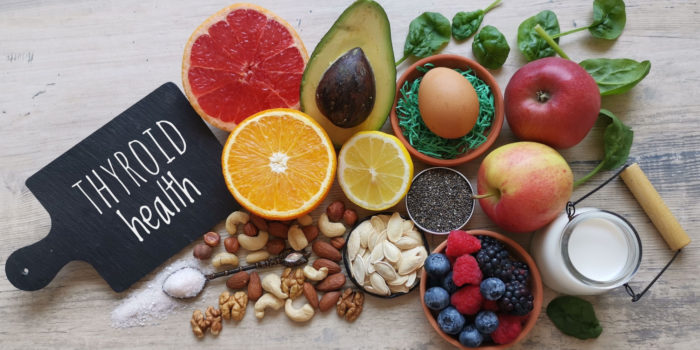
An underactive thyroid – when the thyroid doesn’t meet the needs of the body
December 12th, 2023An underactive thyroid, also known as hypothyroidism is the term used when the thyroid doesn’t meet the needs of the body because of a lack of hormones. It is a common dysfunction, and without enough thyroid hormones, the body slows down affecting every organ in the body, even the heart. An underactive thyroid can most notably cause weight gain, fatigue, heart palpitations, puffiness in the face and lumps around the throat.
The brain is the caretaker
The brain acts as a caretaker to the thyroid. The pituitary gland is located in the brain and supervises the hormones the thyroid produces. The pituitary gland monitors and controls the thyroid hormones in the bloodstream. If the thyroid doesn’t perform its job efficiently, the pituitary gland produces TSH (thyroid-stimulating hormone). The TSH sends a message to the thyroid telling it if it is under or overproducing hormones.
The neck is like a bridge from the brain to the body
The neck is like a bridge from the brain to the body. The thyroid is a butterfly-shaped gland at the front of the neck below the larynx. It has two lobes on each side of the windpipe. The thyroid is an endocrine gland made up of special cells that make hormones. The hormones produced by the thyroid are chemical messengers which relay information to the organs in the body.
Thyroid hormones – T1, T2, T3 and T4
The most relevant hormones produced by the thyroid T3 (Thyroxine that contains 3 iodine atoms) and T4 (Thyroxine that contains 4 iodine atoms) help to regulate vital bodily functions such as the heartbeat, body temperature and metabolism. The most relevant hormone connected to hypothyroidism is T4. Associated and lesser-known hormones T1 and T2 convert into T3 hormones, assisting T4.
Natural supplements such as ThyroidPro can support Hypothyroidism. They contain the thyroid hormones T1, T2, T3 and T4.
Thyroid superfoods
A diet rich in selenium and iodine can promote good thyroid health.
Iodine is the most important of the two. Foods that are rich in iodine are:
- Eggs
- Milk
- Yoghurt
- Icecream
- Sushi
- Seaweed
Foods rich in selenium are:
- Fish that are high in omega-3 fatty acids, such as salmon, cod, sea bass, haddock and perch. Tuna is also rich in selenium
- Eggs
- Nuts – brazil, macadamia and hazelnuts
Thyroid awareness
People of all ages can suffer from hypothyroidism. Sometimes an underactive thyroid disorder can go unnoticed until profound effects develop. A full list of symptoms of hypothyroidism can be found here. An underactive thyroid can lead to a poor quality of life, resulting in reduced mobility and mental health issues.
Thyroid disorders can be present at birth or develop at any age, most commonly between the age of 20-40 years old and more predominantly in women. Thereafter, a woman aged 60+ is prone to that type of disorder due to changes brought around by the ageing body. Previous illnesses or treatments can increase the risk of developing a thyroid issue. Genetic factors contribute to 65% of an individual’s thyroid state, and a recent study has revealed 100 genes linked to thyroid hormone levels.
It is the first study of its kind to observe how genes affect the function of the thyroid in different ethnic groups and if the same genetic variation is linked to thyroid cancer. The research findings came from the use of electronic health records from 250,000 people. Scientists hope this will help to identify future treatments for underactive and overactive thyroid or thyroid cancer. It hopes to identify people at risk of developing those conditions.
Dr Catherine John co-led the study at the university and she explained that “We used innovative data science approaches including utilising records of routinely measured thyroid function in consenting participants. It’s the first study to look at how genes affect thyroid disease risk.”
Dr Alex Williams, the first author of the study said, “In the future, risk scores like the ones developed in this study could help doctors to understand who is at risk of developing thyroid disease, which treatments might work best for different people, and which treatments should be avoided because of potential side-effects.”
Diagnosis of thyroid disorders can be done by physical examination, medical history review and blood tests. Those tests are done to find out the levels of the hormones TSH, T4 and T3.
Some treatments for thyroid disorders are medications, radioiodine therapy or surgery. Much-needed ongoing research will result in new tests and treatment options.
Maintaining a healthy lifestyle, avoiding smoking, and reducing alcohol and toxins consumption can promote good thyroid health. In addition, stress relief, solid sleep, regular exercise and safe sun exposure are very beneficial.
To build awareness of thyroid disorders there is an annual World Thyroid Day on the 25th of May.
References
https://www.health.com/condition/thyroid/healthy-thyroid-0
https://www.cancerresearchuk.org/about-cancer/find-a-clinical-trial
https://www.quora.com/What-are-T0-T1-and-T2-hormones
https://www.cancer.org/cancer/types/thyroid-cancer/about/key-statistics.html








